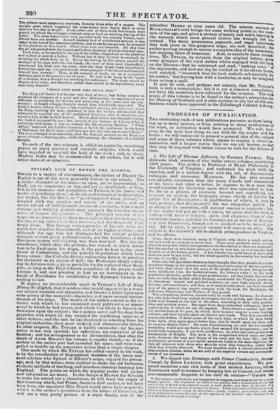TYTLER'S LIFE OF HENRY THE EIGHTH.
OWING to a variety of circumstances, the history of IlReny the Eighth is one of the most generally known in our annuls. The peculiar character of the man,—so open, yet so hypocritical : so bluff, yet so courteous; so lax, and yet so struitlaced ; so Eng- lish in his mannere and prejudices, so Turkish in his tastes tied modes of petits ing them ; so Wieldy and tyrannical in disposition, yet withal, like the Devil, so " good-tempered when pleased,"— coupled with the 'lumber awl variety of his wives, and an occasi •nal act of bold dramatic justice or generosity, firm a most curious and striking portrait even amongst the countless curio- sities of human idiesyeeracies. The principal persons of Ibis reign are as interesting is their master, from their intrinsic enteits, the surptising varieties of their fortunes, and too frequently their tragic close. The foreign conteniporinies of hENRY were not much less singular than himself, and of ter higher abilities : and although the age was not distinguished for viol( nt political changes or even great political events, yet the foundation of the European system still existing was then first laid. But the cir- cumstance, which after all, perhaps, has caused so much atten- tion to be fixed upon his reign, is the part he bore in the over- throw of Catholicism, and the priestly disputations which have hence arisen : the Catholic divines exhausting horror in painting his character as an engine of hell ; the Protestant clergy soften- ing its features with a pious partiality for the author of their flesh- pots, as long as the Iligh Church prejudices of the people would tolerate it, and now pointing to him as an instrument in the hands of Providence for establishing the Episcopal Church ac- cording to law. It argues no inconsiderable merit in TYTLER'S Life of King Henry the Eighth, that it renders what would appear to be a worn- out subject readable and attractive, and throws a fuller light upon some points of the monarch's character, and upon several circum- stances of his reign. The merits of the author consist in the in- dustry with which he has examined every publication or mane- cerise to which he had access, and which was likely to furnish in- formation upon the subject ; the common sense and freedom from
prejudice with which lie has weighed the conflicting opinions of other writers ; and the tact lie has displayed in selecting from his original authorities their most striking and characteristic details.
In other respects. Mr. TYTLER is hardly successful : for his nar- rative is not very spirited; his reflections are somewhat of the feeblest ; and his arrangement so fur ill-considered, that after the death of ANNE BOLEYN the volume is rapidly closed,—as if the author in the earlier part had exceeded his space, and were COCO-
pelled to huddle up the remainder in less than a single chapter.
One mode by which Mr. TYTLER has added variety to his work, is by the introduction of biographical sketches of the many emi-
nent scholars who figured in liteRv's reign, enjoyed his patron.
age, and, by that means, were enabled to shake the old barbarous sholastic methods of teaching, and introduce classical learning into
England. The points on which the popular reader will gather new information are many. In the design of Meer the Seventh to make his second son a churchman, be will trace the origin of that learning which, had Prince ARTHUR died earlier,or not have been burn, our impatient Blue Beard would never have acquired ; whiht in the author's quotations from the letter., of ERASMUS, he will see a very pretty picture of a royal family, and of the
•
schoolboy HENRY at nine years old. The minute account of BUCKINGHAM'S trial brings out some striking points in the teen. ners of the age, and gives a picture of manly and noble bearing is the accused, which mote general history has wrongly left un- noticed. The many processions, pageants, and regal interview. that took place in this gorgeous reign, are well described; the author quoting enough to convey a complete idea of the mummery, but stopping short of weariness. And, to conclude these intim. tious, Mr. TYTLER, by extracts from the original letters, gives some glimpses of the royal author whilst engaged with his book on the Divorce—how he conversed and read, "making notes ' of the arguments, and how one day he worked on it for eleven hours, well satisfied, "insomuch that his book maketh substantially for his matter," but leaving him with a headache, as may be imagined from so long a spell.
It may be said, and perhaps not untruly, that Mr. TYTLER'S book is only a compilation; but it is not a common compilation; nor have the materials been collected for the occasion. The true origin of this volume is to be found in the author's researches for his History of Scotland, and it adds another to the list of able pro. ductions which have appeared in the Edinburgh Cabinet Library,


























 Previous page
Previous page